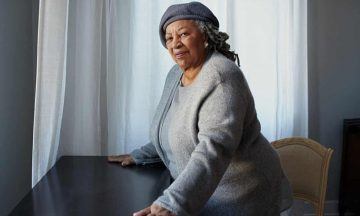Hermione Hoby in The Guardian:
 Of all the mantles that have been foisted on Toni Morrison’s shoulders, the heaviest has to be “the conscience of America”. It’s both absurd-sounding and true. For almost half a century her subject has been racial prejudice in the United States, a story that she has told and retold with a steadiness of rage and compassion. Her latest novel, God Help the Child, is her 11th and when I arrive at her apartment in Tribeca, Lower Manhattan, America’s Conscience is having her eyebrows drawn on. “For the photographer,” she explains with a chuckle.
Of all the mantles that have been foisted on Toni Morrison’s shoulders, the heaviest has to be “the conscience of America”. It’s both absurd-sounding and true. For almost half a century her subject has been racial prejudice in the United States, a story that she has told and retold with a steadiness of rage and compassion. Her latest novel, God Help the Child, is her 11th and when I arrive at her apartment in Tribeca, Lower Manhattan, America’s Conscience is having her eyebrows drawn on. “For the photographer,” she explains with a chuckle.
Later, she’ll tell the photographer: “We did makeup for you. I have eyebrows and everything,” then add: “You lose all that stuff … ” The implied second half of that sentence is “when you reach my age”: Morrison turned 84 in February. Her many literary laurels include a Pulitzer in 1988 for Beloved, a Nobel in 1993, and, in 2012, the presidential medal of freedom, from her friend Barack Obama. Being America’s most venerated living writer does not, however, stop a person wanting to look good in pictures. And, it is natural that beauty and the notion of self-image are on her mind as at the centre of her new book is a striking, dark-skinned woman called Bride who tries to shield herself from her own past with surface beautification. A love story unfolds, precariously, between her and Booker, a scholarly young black man adrift in grief for a dead brother. He tells her: “scientifically there’s no such thing as race, Bride, so racism without race is a choice. Taught, of course, by those who need it, but still a choice. Folks who practice it would be nothing without it.”
Bride’s blackness is both the source of her childhood misery – her lighter-skinned mother is so horrified by it that she considers killing her baby – and of her adult success. She works in the fashion and beauty industry where, heeding one stylist’s dictum to dress only in white, she makes herself, “a panther in snow”, an exoticised “other”. The novel intimates that fetishising blackness, both for the observer and the observed, might be just as insidious as outright prejudice. There’s the ex-boyfriend, for example, who seems to claim her as some kind of racial trophy. When this young white man takes her home to his parents it’s clear “that I was there to terrorise his family, a means of threat to this nice old white couple. ‘Isn’t she beautiful?’ he kept repeating … His eyes were gleaming with malice.”
More here. (Note: Throughout February, at least one post will honor The Black History Month. This year’s theme is “African Americans and the Vote.” Readers are encouraged to send in their suggestions)
